The Artificial Intelligence (AI) world is expanding at an extremely rapid pace. It is not only used in giant corporations anymore. AI tools are used by small teams and even students on a daily basis. They assist us in doing things fast, whether it is writing e-mails or organizing trips and business decisions.
Here are the large numbers to consider how important AI has become:
- By 2024, the global AI market was approximately 233 billion dollars. People spend a lot of money on AI tools that are huge.
- Analysts believe that this market will reach an estimated figure of 1.7 trillion by 2032. This expansion indicates that AI is a mega-wave and we all require a good surfboard!
- The use of AI is also being applied to combat fraud and make smarter decisions by many companies, such as financial companies and health care companies. This application implies that an increasing number of individuals require easy and powerful AI platforms.
- Companies in North America are the biggest spenders on AI. They constituted approximately 36 per cent of the total AI expenditure in the world in 2024. This demonstrates that the demand to develop improved AI tools is extremely high in this location.
Due to the significance of AI, a variety of companies create the tools to assist you in creating your personal AI assistants. One of them is Abacus AI alternatives. But as you do when you are buying a new bicycle, you never stop and just look.
What is Abacus AI?
Abacus AI is a platform that assists in assisting businesses utilize the power of Machine Learning. Machine Learning implies that a computer will learn on its own, with no instructions as to what to do.
Imagine Abacus AI as an intelligent assistant that develops other special assistants. It ingests the data of a company and autopilots through the generation, training, and utilization of custom AI models. This allows a company to train the AI to perform a particular task, such as recommending a customer the next items to purchase or identifying issues on a production line.
Basic Key Features and Functions.
There are numerous powerful tools of Abacus AI that can enable companies to make their AI projects move quickly. The most significant things it can do are as follows:
- Automatic Model Training – It is one of its greatest strengths. Rather than a human being spending months on codewriting, Abacus AI takes the data and automatically constructs the most effective AI model.
- Real-time insights– The platform will be able to analyze data and provide you with solutions in real-time, not in hours. Think about a store that has to adjust its prices according to what people are purchasing this minute, that is what Abacus AI does.
- Generative AI Tools (Deep Agent/ChatLLM) – Abacus AI relies on what is referred to as Deep Agent, a super-assistant. It is capable of multi-step and complicated jobs. As an illustration, you can say, Build a website to promote our new product and write all the contents and it attempts to do everything.
- Scalability at High Level -This implies that the platform can expand with your company. It does not matter whether you have a small piece of data or a mountain of data, Abacus AI can process it and continue operating rapidly.
- Custom Models and Datasets: Companies can take their own unique data and create their own custom AI models. This provides them with much power to address their very business issues.
To sum up, Abacus AI is a one-stop AI environment that is supposed to simplify and quicken the development and deployment of complex AI applications in large corporations significantly.
Why are the People seeking Abacus AI Alternatives?
You may be wondering why humans seek alternatives to Abacus AI in case it is so good. It is much like the purchase of a very fancy, complicated new phone. It is equipped with everything but in some cases, the less complex ones are better suited to your daily life.
There are generally several obvious reasons why people begin seeking alternatives:
1. Baffling and random Pricing.
This is a complaint that is most widespread. A credit-based system is frequently used by Abacus AI. This may render the overall cost highly perplexing.
- Problems: Teams are at a loss of how much they will spend next month. The credits may even disappear, or a project may consume more credits than anticipated.
- Result: Companies must adhere to a budget. Once the cost is unexpected each month, it will be a huge issue among managers. They desire definite and set prices that they can rely on.
2. Absence of Good Customer Support.
You require assistance whenever something goes wrong when you are using a powerful, intricate tool.
- Problems: According to some users, the Abacus AI support team is extremely hard to reach and provide fast and clear assistance.
- Result: When your Artificial Intelligence model malfunctions and you no longer have someone to call to assist you, then your entire business process halts. This causes individuals to seek firms that provide committed and quick service.
3. Too Complex or Buggy Performance.
The platform attempts to do a lot of things simultaneously and it could be overwhelming or unstable at times.
- Problems: A problem with the interface is that the interface is confusing to some users. It can be buggy, i.e. contains minor errors, or works slowly at times.
- Result: The platform is too large and complex to a small team only needing to automate one simple task. They seek easier to use tools that are easy to install and simply do the job.
4. Not The Right Person to Do Easy Work.
Abacus AI is a general-purpose, powerful toolkit, which is fantastic in creating massive, complex data science systems.
- Problems: In case a business only requires a basic AI chatbot to assist customers, then using Abacus AI resembles using a giant dump truck to transport a single box. It is overkill.
- Result: Teams seek specialised options, such as a tool designed specifically in customer service AI or marketing recommendations. These are specialized tools that are usually more convenient, less costly and quicker to run that single job.
Due to these facts, many businesses are currently considering other platforms. They desire a tool that fits their very specifications: perhaps it has to be more supportive, less expensive, or a tool that is specialized in doing one thing.
You Might Like: Free All SMO Tools
Key Metrics to Compare (When Choosing Alternatives).
You should be able to have a checklist before you choose a new AI platform. These are the most crucial points that you need to consider in comparison of the Abacus AI alternatives:
10 Best Abacus AI Alternatives to Try
This is a more detailed look at the best alternatives. We concentrate on their best things and why you may want them.
1. Google Vertex AI
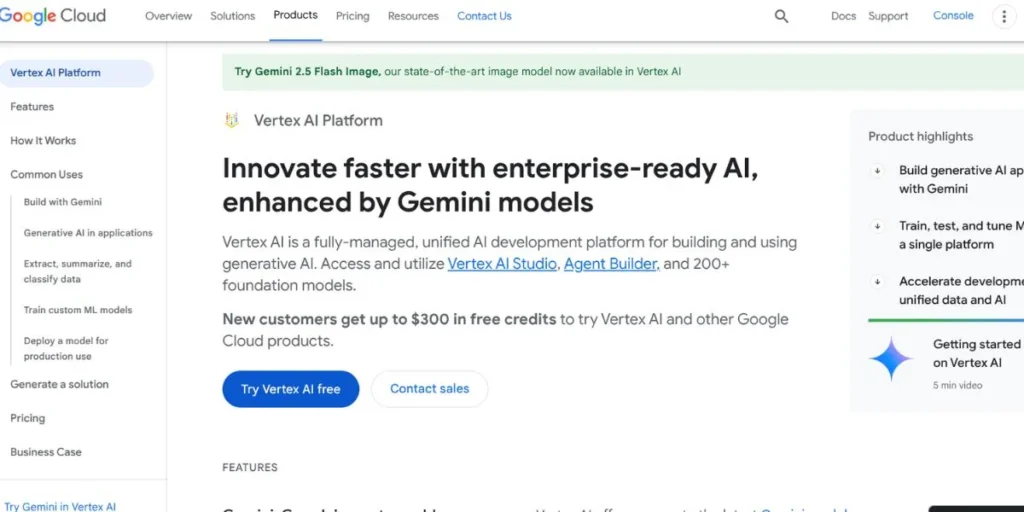
Vertex AI is the Google service to build, deploy and manage machine learning models. It is one of the best Abacus Ai alternatives. When you are already a user of Google Cloud, it fits perfectly well. It provides both easy drag-and drop tools and complex code to data scientists with expertise.
It can be used by businesses of any size to perform various tasks such as image recognition, text analysis, or sales forecasts. It takes care of the entire AI procedure, maintaining models trained and current. It is reliable as it is produced by Google and can be scaled to a very large project.
Key Features:
- Vertex AI Workbench: one environment to do all of your data science.
- AutoML: trains quality models on your data with minimal code.
- Generative AI Support: fine-tuning and large language models of Google.
Pros:
- Google Cloud provides a lot of scale.
- Powerful language model and generative AI.
- Compatible with Google Cloud software like BigQuery.
Cons:
- Pricing is complicated and could be difficult to control.
- Can be too complicated for small projects or beginners.
Pricing: Usage-Based (Pay-as-asYou-Go). The cost is based on processing power and storage.
Website Link: https://cloud.google.com/vertex-ai
2. Microsoft Azure Machine Learning.

Azure machine learning provides a solution to every AI and ML requirement of Microsoft. It fits well with those companies that are already on Microsoft Azure and Microsoft 365. The platform has a familiar and secure platform to build, train, and deploy models.
It contains coders and drag and drop to beginners. It is one of the best Abacus Ai alternatives. Microsoft is dedicated to security and compliance and is significant to banking and healthcare. It can also easily monitor and maintain a model once deployed.
Key Features:
- Studio Interface: an intuitively created visual workbench to create and control models.
- Responsible AI: software to aid in making sure your models are transparent and fair.
- Tight Microsoft Integration: is compatible with all the Azure cloud services.
Pros:
- Good security and compliance.
- Compatible with Microsoft tools already in use by numerous companies.
- Non-coder and coder balanced approach.
Cons:
- It may be expensive when the resources are not properly handled.
- Not so flexible when not using the Azure ecosystem.
Pricing: Usage-Based (Pay-as-You-Go). There are computer hours and storage fees.
Website Link: https://azure.microsoft.com/en-in/
3. DataRobot
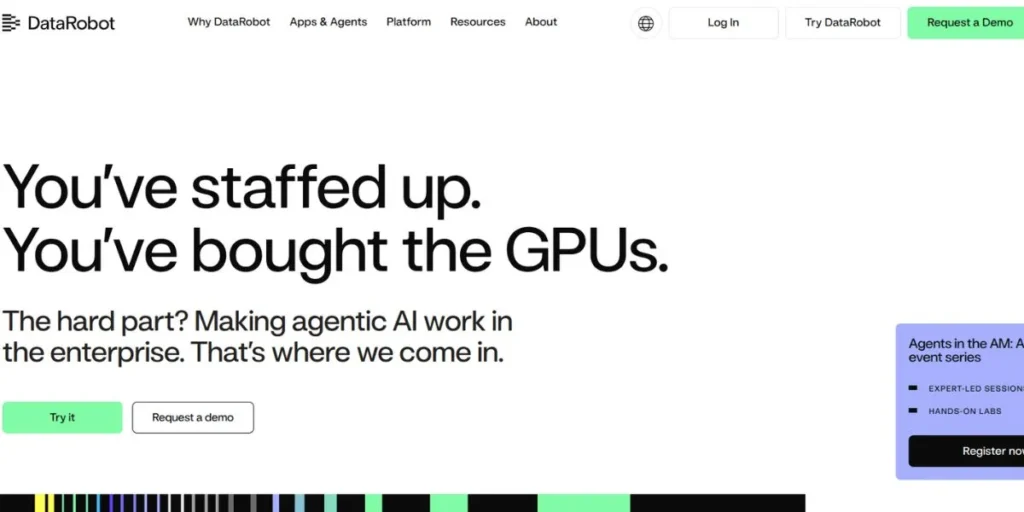
One of the most popular Machines learning Automated (AutoML) platforms is DataRobot. It allows business analysts and non-coders to swiftly create strong AI applications without creating extensive code. It also automatically experiments with many different algorithms and settings to discover the optimal model to your data. You simply feed it the data and give it what you want to predict, such as customer churn or equipment failure.
DataRobot handles the rest. This velocity is appropriate to companies that require quick AI results. It does not concentrate on low-level coding, but on business outcomes, and helps to understand why a predictor went towards a particular result of a model, which is essential to trust and also compliance.
Key Features:
- Automated Machine Learning (AutoML): automatically constructs and ranks the most optimum models.
- Model Explainability: provides a clear explanation why the AI has taken a particular decision.
- Model Deployment: simple applications to deploy the working model into your business system.
Pros:
- Fastly transforms data into action models.
- Selected by non-data scientists and business analysts.
- Makes you know why the models are so.
Cons:
- May be prohibitively costly, frequently required to be a bespoke contract.
- Provides less control of fine details of the model to expert coders.
Pricing: Subscription (Custom Quote). Depending on features and size of company.
Website Link: https://www.datarobot.com/
4. Amazon SageMaker
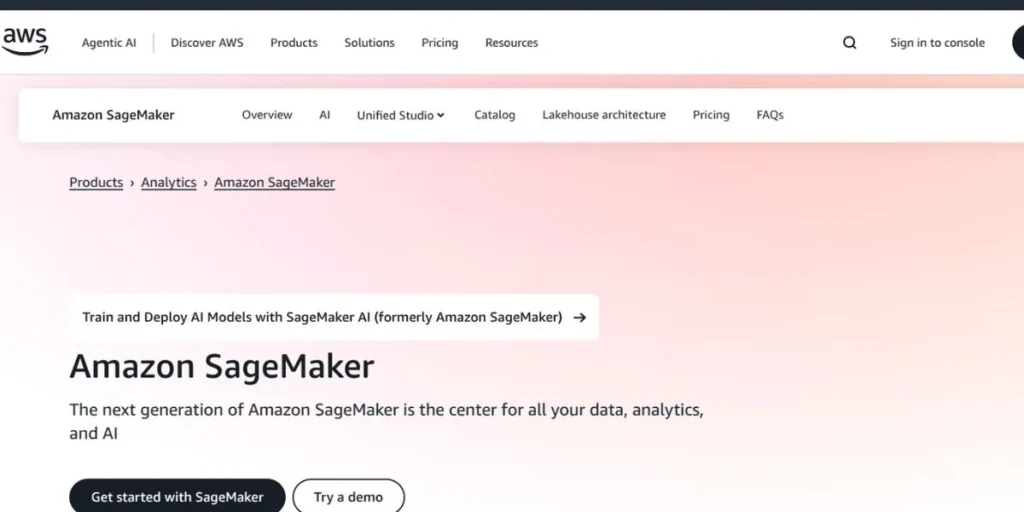
SageMaker is the Amazon Web Services (AWS) machine learning service. It contains tools for all the stages of the machine learning process. Since it is a subset of AWS, it is able to process a significant amount of data and perform rapid processing. It is one of the best Abacus Ai alternatives. Teams that are already using AWS are better suited to it.
It has pre-made models and sophisticated deep-learning tools. It is very flexible, as you can select the tools you require. SageMaker is used by many large corporations using AWS to create AI. It is reliable and has been in use since time immemorial.
Key Features:
- Full machine-learning life cycle tools: labeling data, training, tuning and deploying models.
- SageMaker JumpStart: ready-made models that you can just use.
- Massive scalability: It can train and use thousands of processors on big data.
Pros:
- AWS users can scalemax their applications with the best integration.
- It is open and thus you can use any code library or framework.
- It has numerous tools on virtually any machine-learning task.
Cons:
- It is highly complicated and it is overwhelming to the beginners.
- Cost management may be a challenge unless it is thought out.
Pricing: Pay as you go (usage based). You are charged by the time your computer executes.
Website Link: https://aws.amazon.com/sagemaker/
5. Dataiku
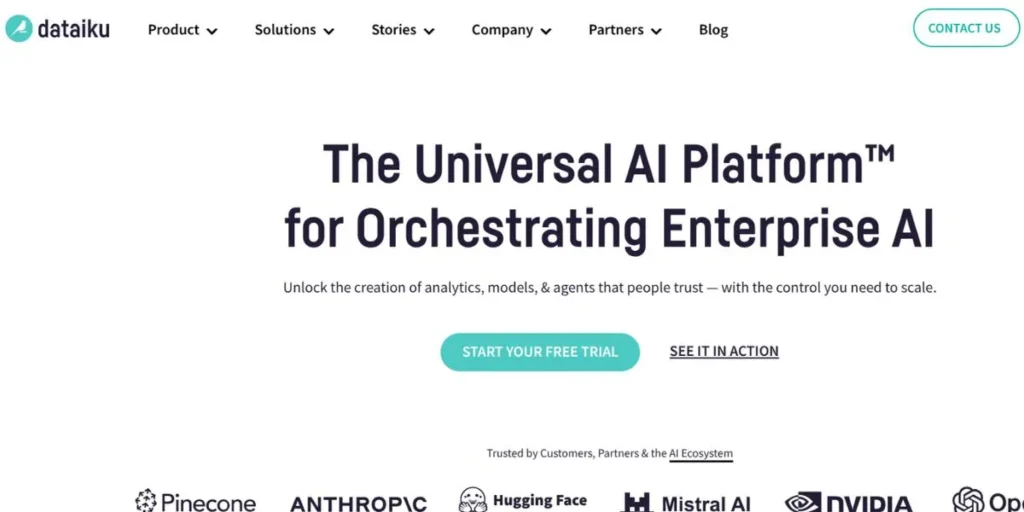
Dataiku is a collaboration tool to work on data science and AI projects. It is effective in large corporations where coders, managers, and analysts should collaborate. It possesses a visual interface (a flow) that is visible to everyone observing what is going on with the data and model. This puts all on the same page and accelerates projects since people do not spend time communicating.
It is linked to virtually any source of data you can imagine, thus drawing all of your data into a single clean location. Dataiku enables businesses to use their data without complexity, not only to create AI models, but also to do basic reporting and cleaning. It is a real Joint collaborative data-science workbench.
Key Features:
- Visual Flow: a basic diagram that presents all the steps of the project.
- Team Collaboration: the tools that allow the coders and non-coders to work together.
- Wide Data Connections: supports virtually every big data and cloud service.
Pros:
- Ideal in the case of large, multi-purpose teams which require collaboration.
- The graphic interface simplifies complicated projects.
- It is an all-encompassing platform of all data operations, not only machine learning.
Cons:
- Primarily used by enterprise companies and is sometimes excessive to small businesses.
- Will need a substantial capital investment (custom quote).
Pricing: subscription (individual quotation). Based on users and servers.
Website Link: https://www.dataiku.com/
6. Predibase
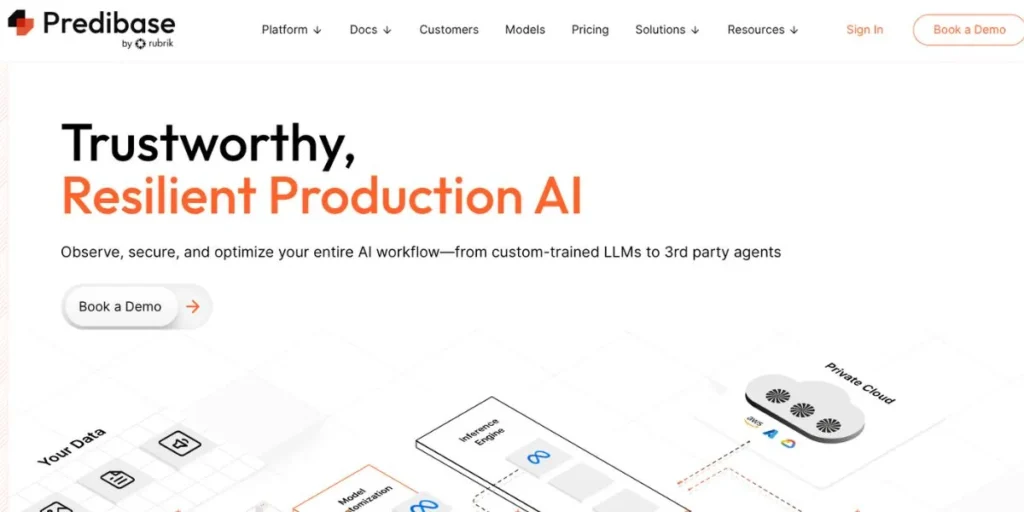
The new world of large language models (LLMs) and deep learning is pre-programmed with prediabase. Predibase is very easy to train, fine-tune, and run large generative AI models, whereas Abacus AI is good with general machine learning. Consider it an LLLM-friendly factory. It allows you to use open-source models (such as Llama or Mistral) and easily fine-tune them on your own company data. This implies that you can build a smart chatbot that is aware of your business only.
It is also cheaper and faster than performing the same task on a large cloud platform, and thus you can create custom LLMs very fast and start using it immediately.
Key Features:
- LLM Fine-Tuning: software to fine-tune big models on your own data in a few seconds.
- Simple deep learning: eases complex models to handle and implement.
- Fast model serving: executes your own models at high speed in the real time.
Pros:
- Specialty and best with generative AI and LLMs.
- More efficient methods of training and using deep-learning models.
- Provides you with the strength of open-source models on an easy to use, controlled platform.
Cons:
- Not as interested in simple machine learning tasks such as simple forecasting.
- Requires a bit of technical expertise in the field of deep-learning.
Pricing: subscription (in tiers) and usage-based.
Website Link: https://predibase.com/
7. Pachyderm (A Powerful Data Management tool)
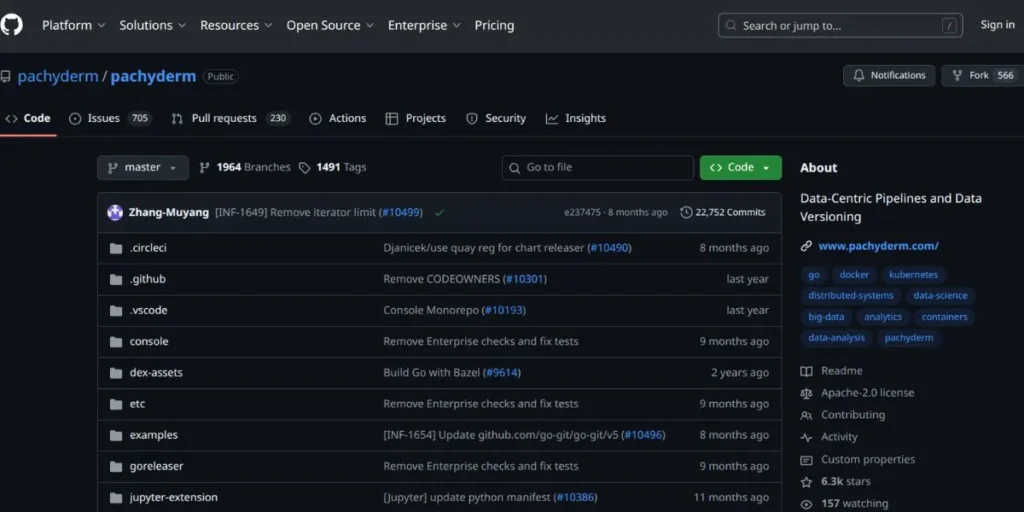
Pachyderm is not a full-service AutoML system such as Abacus AI, but it addresses a large issue that all AI systems face: data and model version management. Imagine that it is a time travel machine of data science.
It maintains a record of all the data you work with and all the models you create. In case a model fails or produces the incorrect answer, you may immediately revert to the same data and code that generated the model. This helps in making your work more reputable and responsible which is significant to regulated industries. Pachyderm is used by companies with their machine-learning workflow established and requires greater control over their data pipeline.
Key Features:
- Data Versioning: maintains a record of every data change, such as a data Git.
- Data Pipelines: assists in linking and automating the entire process of data processing.
- Data Lineage: provides a diagram of both the start and finish of your model.
Pros:
- Gives ideal control and monitoring of any data and models.
- Excellent in audits and compliance in situations you require evidence on how AI was constructed.
- Works well with other existing tools such as SageMaker or Kubeflow.
Cons:
- Not a machine-learning building tool It is not an all-in-one tool, but it is a data/version control tool.
- More advanced and with DevOps/MLOps in mind.
Pricing: subscription (individual quotation).
Website Link: https://github.com/pachyderm/pachyderm
8. Hugging Face (The Open-Source Hub)
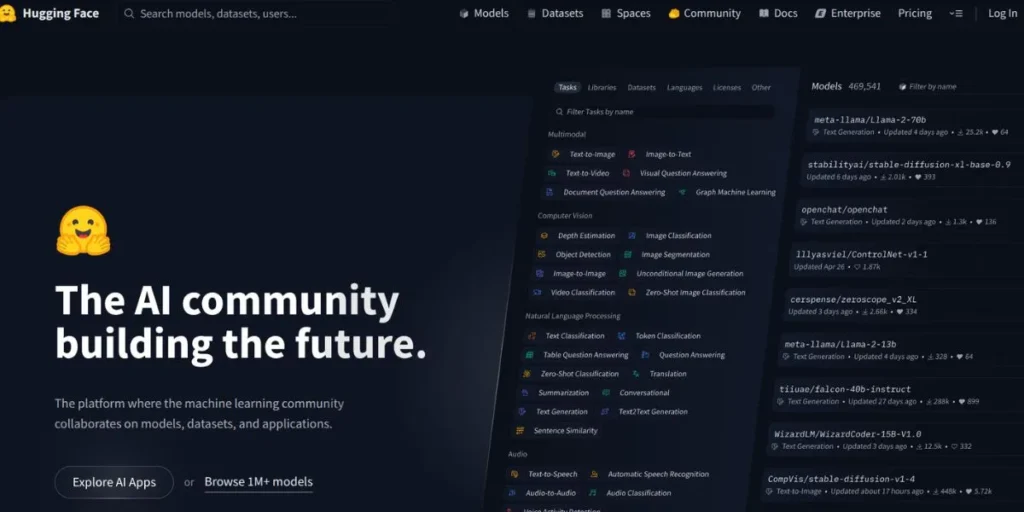
The other type of platform is Hugging Face. Consider it a large open library where all of the AI world can share and discover new models. It offers thousands of free downloadable ready-made models.
That makes it awesome to developers, students and companies who need the newest AI but do not want to be tied to one large company. The Hugging Face core library is free, but you can also pay to use it, such as with the Hugging Face Inference Endpoints, which allow you to quickly and reliably run and scale these models on a trusted cloud. It is a nice location to keep in touch with the latest AI.
Key Features:
- The Hub: Free and open-source models and datasets to download in thousands.
- Transformers Library: Easy to write simple code to use the most complex language models.
- Inference Endpoints: Paid service to execute models on the cloud in a fast and reliable manner.
Pros:
- Free access to the biggest library of state-of-the-art AI models.
- highly adaptable and is not bound to a particular cloud service provider.
- Free to begin and learn most tests and learning.
Cons:
- It involves the use of code, and it is not a drag-and-drop, no-code tool.
- Scaling a model may involve technical knowledge of the clouds.
Pricing: Free/Open Source, paid Cloud/API services to use in production.
Website Link: https://huggingface.co/
9. MonkeyLearn (Text AI Expert)
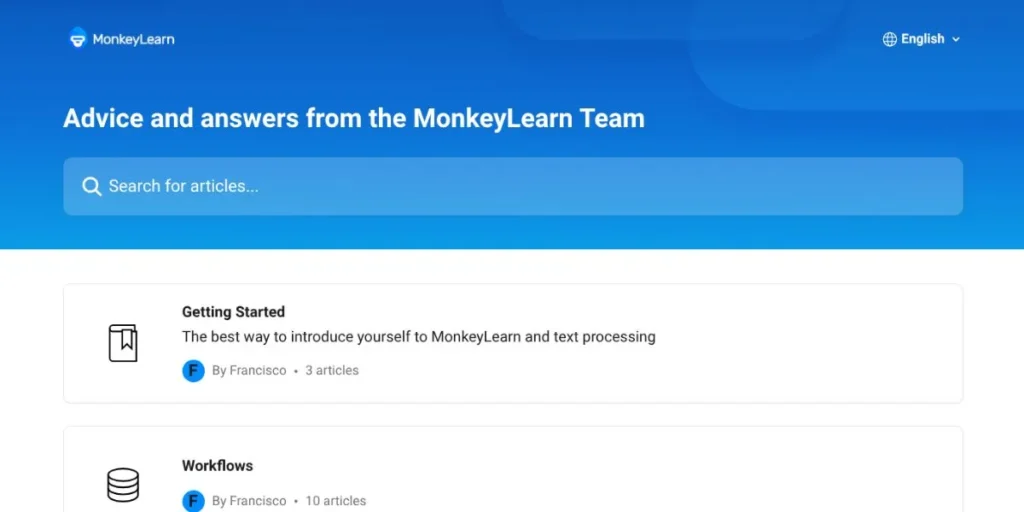
MonkeyLearn would be a good option in case you primarily need to comprehend text. With a large number of customer emails, feedback surveys, or chat logs, MonkeyLearn will be able to process all of that text in a short amount of time. It is capable of machine learning to accomplish tasks such as Sentiment Analysis (determining whether a customer is happy or angry), or Text Classification (categorizing emails as either a Billing, Support or Sales email).
It is one of the best Abacus Ai alternatives. It is highly user-friendly and does not require any advanced data science knowledge. It takes you minutes, not days to build a working text classifier.
Key Features:
- Sentiment Analysis: This automatically informs you about the emotion (positive, negative, neutral) of a text.
- Text Classification: Categorizes text into categories of your choice.
- Extractor: Identifies significant names, dates and keywords within the text.
Pros:
- It is incredibly simple to work with when it comes to text analysis work.
- It is an effective specialist tool, which focuses on text only.
- It has a free tier to begin with, so it is not risky to test it.
Cons:
- It is unable to create generic ML models such as image recognition or sales prediction.
- It is only for text‑based data.
Pricing: Tiered Plans (Subscription), Free.
Website Link: http://help.monkeylearn.com/en/
10. Eesel AI (Specialist in Support AI)
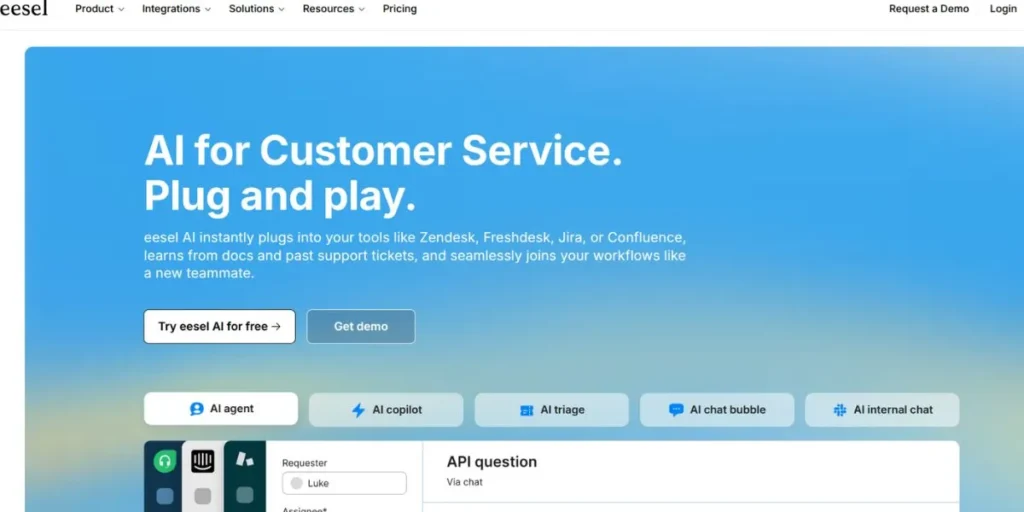
eesel AI is a barebones, narrow-purpose tool designed solely to produce intelligent AI agents to serve on customer support and internal help desks. Unless you have a specific interest in providing improved responses to frequently asked questions by customers, eesel AI would be more suitable compared to a large-scale platform such as Abacus AI. It can be installed in just a few minutes- it reads your help articles, old tickets and company documents.
This renders the AI a business guru. It is one of the best Abacus Ai alternatives. Due to its focus, it has a transparent pricing (a fixed fee per month), which does not leave credit systems confused. It begins to solve actual business challenges immediately without having a team of full-time data scientists.
Key Features:
- Self-Service: Have a working AI agent within minutes, not weeks.
- Unified Knowledge Source: Knows all of your existing documents (Zendesk, Slack, Confluence).
- Easy to understand pricing: No hidden charges on each ticket solved.
Pros:
- It is light, speedy and simple to install to provide customer care.
- Prices are transparent and cost-effective.
- One thing it does, it does well and it is specialized in one business activity.
Cons:
- It is unable to perform deep learning and general business predictions.
- It is used only to automate internal Q&A and customer support.
Pricing: Monthly Flat (Transparent plans).
Website Link: https://www.eesel.ai/
How to Choose the Right Alternative for You
The most important step is to select the appropriate tool. Do not simply select the one that has the largest name. To identify the tool that best suits your team, do the following:
Step 1: Know Your Problem
Write down first the singular thing you want the AI to do.
- Do you want to prevent the exit of customers (forecasting)?
- Would you like to respond to support questions (customer service) more quickly?
- Would you like to automatically sort mail (text analysis)?
When your issue is straightforward and extremely focused (such as merely responding to questions), choose a dedicated tool such as MonkeyLearn or eesel AI. When your issue is massive and intricate (such as creating an entire new system), then you require a large cloud platform such as Vertex AI or SageMaker.
Step 2: Check Your Team’s Skills
Examine your team members.
- Are you professionally coded and data scientists? They will be in love with the strength and dominance of Hugging Face or SageMaker.
- Do you have non coded business analysts on your team? They will fare far better in the user-friendly DataRobot or Dataiku (and its visual flow).
Step 3: Examine Your Existing Tools.
Your new AI platform will have to integrate with your old tools.
- Do you use AWS for everything? Then the best choice is Amazon SageMaker, which is the easiest one.
- Are you a user of Microsoft Azure and Office 365? Then Azure Machine Learning will not be out of place.
- Do you consume a lot of Google services? Then the obvious winner is Google Vertex AI.
Step 4: Demand Simple Pricing
Do not register with anything having a baffling credit system that may shock you.
- Question the vendor: Would you provide me with a straightforward price which I can count on each month?
- Select Tools with Flat Monthly Fees where possible, or at least an obvious Pay as you go price that you can easily keep track of. When money is concerned, clarity is better than complexity in every case.
Through all these four steps, you can escape the bewildering complexity and unpredictable expenses that scare people out of Abacus AI. You select one with clarity, simplicity to your team and that which best suits the task you require to perform.
Conclusion
The era of AI is as rapid as it has never been before. AI model building tools such as Abacus AI alternatives demonstrated the potential of automatic AI model building. Nevertheless, another important lesson that we learned was that a powerful tool should be easy to operate, cheap, and supported. To a business today, it is not about how much AI is being used, but how it is being used intelligently. With a large company and skilled coders, you can look forward to the large cloud solutions such as Google Vertex AI and Amazon SageMaker.
When you are a business team, and need to be fast and straightforward, DataRobot is your ally in creating powerful models in a short time frame.
And when you only need one issue resolved, such as customer service or text-processing, a dedicated app such as MonkeyLearn or eesel AI will yield the most promising results with the least amount of trouble and the most understandable pricing.
There is no need to be shy and check out various alternatives. There is the right tool for your job. Identify the one that can make your team smarter, budget simpler and projects easier to complete.
Also Read: Adobe Illustrator Alternatives
FAQs
Does Abacus AI target developers primarily?
Yes, it can be very difficult when it requires a good grasp of the concepts of Machine Learning, which is complex to non-coders.
Which alternative do I select to use with my current Amazon (AWS) tools?
Amazon SageMaker is the most appropriate as it is designed to integrate seamlessly with all of your other AWS services.
What is “AutoML”?
AutoML is an abbreviation of Automated Machine Learning. It implies that the software does the difficult, technical work of searching the most suitable model to you automatically.
Which one should I use: General or Specialist Tool?
Select a General Platform (such as Vertex AI) in case of a complex, custom problem. In the case of a simple single job (such as support questions), a Specialist Tool (such as eesel AI) is selected.

